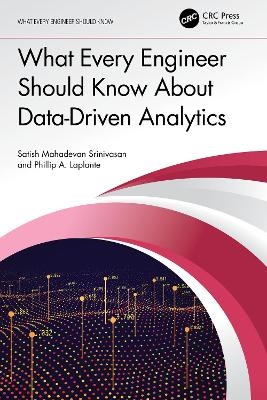
What Every Engineer Should Know About Data-Driven Analytics
CRC Press (Verlag)
978-1-032-23540-0 (ISBN)
What Every Engineer Should Know About Data-Driven Analytics provides a comprehensive introduction to the theoretical concepts and approaches of machine learning that are used in predictive data analytics. By introducing the theory and by providing practical applications, this text can be understood by every engineering discipline. It offers a detailed and focused treatment of the important machine learning approaches and concepts that can be exploited to build models to enable decision making in different domains.
Utilizes practical examples from different disciplines and sectors within engineering and other related technical areas to demonstrate how to go from data, to insight, and to decision making
Introduces various approaches to build models that exploits different algorithms
Discusses predictive models that can be built through machine learning and used to mine patterns from large datasets
Explores the augmentation of technical and mathematical materials with explanatory worked examples
Includes a glossary, self-assessments, and worked-out practice exercises
Written to be accessible to non-experts in the subject, this comprehensive introductory text is suitable for students, professionals, and researchers in engineering and data science.
Satish M. Srinivasan received his B.E. in Information Technology from Bharathidasan University, India and M.S. in Industrial Engineering and Management from the Indian Institute of Technology Kharagpur, India. He earned his Ph.D. in Information Technology from the University of Nebraska at Omaha. Prior to joining Penn State Great Valley, he worked as a postdoctoral research associate at University of Nebraska Medical Center, Omaha. Dr. Srinivasan teaches courses related to database design, data mining, data collection and cleaning, computer, network and web securities, and business process management. His research interests include data aggregation in partially connected networks, fault-tolerance, software engineering, social network analysis, data mining, machine learning, Big Data, and predictive analytics and bioinformatics. Phil Laplante is Professor of Software and Systems Engineering at The Pennsylvania State University. He received his B.S., M.Eng., and Ph.D. from Stevens Institute of Technology and an MBA from the University of Colorado. He is a Fellow of the IEEE and SPIE and has won international awards for his teaching, research, and service. From 2010 to 2017 he led the effort to develop a national licensing exam for software engineers. He has worked in avionics, CAD, and software testing systems and he has published 40 books and more than 300 scholarly papers. He is a licensed professional engineer in the Commonwealth of Pennsylvania. He is also a frequent technology advisor to senior executives, investors, entrepreneurs, and attorneys and actively serves on corporate technology advisory boards. His research interests include artificial intelligent systems, critical systems, requirements engineering, and software quality and management. Prior to his appointment at Penn State he was a software development professional, technology executive, college president, and entrepreneur.
1. Data Collection and Cleaning. 2. Mathematical Background for Predictive Analytics. 3. Introduction to Statistics, Probability, and Information Theory for Analytics. 4. Introduction to Machine Learning. 5. Unsupervised Learning. 6. Supervised Learning. 7. Natural Language Processing for Analyzing Unstructured Data. 8. Predictive Analytics Using Deep Neural Networks. 9. Convolutional Neural Networks (CNN) for Predictive Analytics. 10. Recurrent Neural Networks (RNNs) for Predictive Analytics. 11. Recommender Systems for Predictive Analytics. 12. Architecting Big Data Analytical Pipeline.
| Erscheinungsdatum | 27.03.2023 |
|---|---|
| Reihe/Serie | What Every Engineer Should Know |
| Zusatzinfo | 113 Line drawings, black and white; 113 Illustrations, black and white |
| Verlagsort | London |
| Sprache | englisch |
| Maße | 156 x 234 mm |
| Gewicht | 440 g |
| Themenwelt | Informatik ► Theorie / Studium ► Künstliche Intelligenz / Robotik |
| Technik ► Umwelttechnik / Biotechnologie | |
| ISBN-10 | 1-032-23540-3 / 1032235403 |
| ISBN-13 | 978-1-032-23540-0 / 9781032235400 |
| Zustand | Neuware |
| Informationen gemäß Produktsicherheitsverordnung (GPSR) | |
| Haben Sie eine Frage zum Produkt? |
aus dem Bereich


